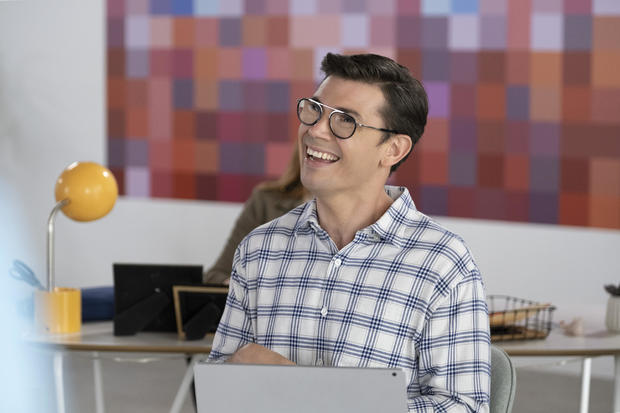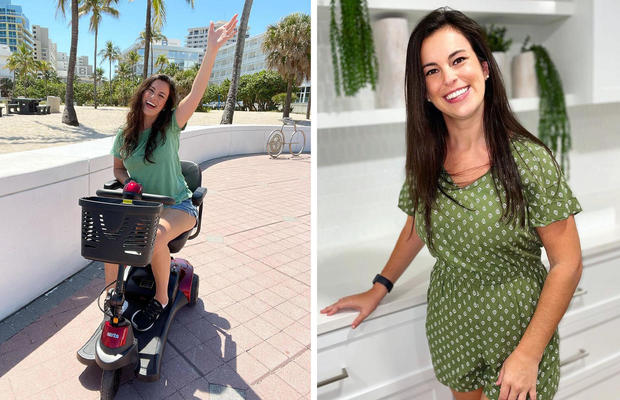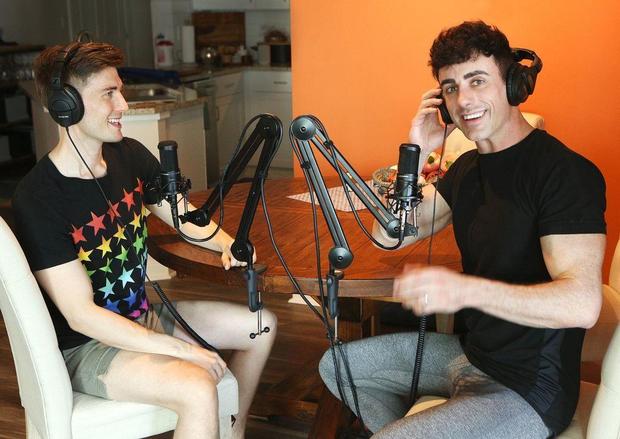Award-winning actor, writer and producer Ryan O'Connell is definitely not shy when it comes to portraying authentic disabled experiences on the TV screen. His show, "Special," has tackled dating, ableism, relationships — and yes, sex.
"Society has castrated disabled people," O'Connell told CBS News on a Zoom call. "It [is] really important that we don't shy away from that, that we give them sexual agency and desire and humanity."
Based off his 2015 memoir, "I'm Special and Other Lies We Tell Ourselves," the Netflix series is often described as a semi-autobiographical show about a gay man with mild cerebral palsy. The series' second and final season drops Thursday, May 20.
Much like his on-screen counterpart Ryan Hayes, O'Connell was born with cerebral palsy and was hit by a car in his 20s. At one point, he never corrected anyone when they assumed his limp was from the accident — until eventually "coming out of the disabled closet."
But that is where the similarities end.
"The character of Ryan in the show is much more of a late bloomer than I ever was. I mean, I was not living at home until I was 28," O'Connell says with a laugh. "A lot of the emotions and feelings that the character Ryan experiences … that feels very personal to me."

O'Connell told CBS News that although many events portrayed in the show are fictionalized, the emotions behind them are not. For example, in season one, crush-turned-boyfriend Carey, played by Augustus Prew, ties Ryan's shoes, serving as an awkward reminder of how often our society "infantilizes" people with disabilities.
"Someone who wants me to cut the line at Disneyland or the airport — love, addicted, need all the help I can get," he says, laughing. "There's such few silver linings in being disabled in a culture that, like, largely ignores you."
But that type of response from a romantic partner? "It's never sexy."
In the show's new half-hour format, expanded from the first season's 15 minutes, "Special" explores Ryan's best friend, Kim, played by Punam Patel, and her relationships, both romantic and familial. This season will feature other actors with disabilities, including comedian Danielle Perez and Nicole Evans.
It also shows a journey to love and acceptance for the main character, something that the show's producer is all-too-familiar with.
For O'Connell, it was important that Ryan undergo the same transformation — to be in a relationship that would test his ability to feel comfortable and valued, to assert his own independence and his own self-worth.
"I spent a lot of my life just being grateful for whatever scraps I was given," he told CBS News of his past relationships. "And I'm no longer at that place, thank God."
Enter O'Connell's real-life boyfriend for more than six years, writer Jonathan Parks-Ramage. O'Connell was hesitant about starting a new relationship and didn't think he could do it — all because he didn't think he was worthy of being loved.
"My brain was just, like ... poisonous and was, like, rejecting anything healthy," he said with a laugh. "But then I realized how amazing he was."
"That, to me, feels like the kind of crowning achievement in my life, more so than 'Special' or anything that I've done professionally."
Dating while disabled: "A lot of trial and error"
Cerebral palsy affects each person differently — it's all about how the brain sends messages to the rest of the body. It is the most common motor disability in childhood, with 1 in 345 children diagnosed, according to the CDC. For disability advocate Chelsea Bear, educating others on living with CP is key.
"My disability — it doesn't define me," she told CBS News on a Zoom call. "And I'm able to bring a lot more to the table than just some of my physical limitations."

When it comes to dating, one of her biggest obstacles lies in trying to convey that message to someone she never met before. When she first joined dating apps in her early 20s, that required a bit of experimentation, she recalls.
At first, Bear wouldn't mention her disability on her profile. When it was time to meet in person, she navigated the best way to tell him about her disability.
"It was a lot of trial and error," she says. "Mostly error."
She's tried being upfront with her disability, which has helped her weed out those who aren't interested in getting to know her. She's also tried showing up without disclosing it at all, making for some pretty awkward moments.
It's not just in-person reactions Bear has to contend with. The social media influencer admits she's had some mixed reactions online as well. Even after texting each other for a month and with plans to meet up, whenever she's disclosed that she has a disability — radio silence. Ghosted.
Other times, she's had a good reaction with the guy saying: "Your disability doesn't matter to me. I still want to meet you." But once they meet — she's ghosted again.
Then there are the times when she is able to tell someone and meet them offline and the subject of disability doesn't come up at all. They're able to look "beyond my disability and just have a perfectly normal conversation or night out."
She also makes it a point to include a photo of herself with her scooter on any dating profiles and sharing that she has a disability — in a lighthearted way.
"For example, I say, 'I have cerebral palsy, but on the plus side I get to cut lines in a theme park.' Just to make it more playful and to let the other person know it doesn't need to be a scary conversation."
Bear's idea of an ideal relationship? "Not someone that kind of completes me, but complements me."
"Where we're both able to do what we need to do to succeed in life … we're in each other's corner pushing each other forward," she muses. "Someone who has a great personality, a good sense of humor … someone that, you know, at the end of the day is just compassionate and understanding."
Like any relationship, knowing your partner is key
Garrison Redd was 17 years old when he was struck by a stray bullet outside his home. Although the shooting paralyzed him, ending his dreams to play pro football, he soon found a new path forward.
Now a Team USA Para-Powerlifter — as well as an author, TedX speaker, and model — he says it was all due to one thing: confidence.
"I went to school. And everyone accepted me when I was in college," he told CBS News in a Zoom call. "I always had, you know, great self-esteem. People naturally gravitated towards me."
That self-confidence was key when he first met his girlfriend, Joniqua Alvarez, two years ago.
They met at a club and when he rolled by, she asked him if he wanted to dance. It was "a match made in heaven," Alvarez said.
"Me, being the celebrity that I am, she just was drooling over me from the time I came in the club," he jokingly adds, laughing.
The two are entrepreneurs, with Redd founding the Garrison Redd Project and Alvarez founding Paw2Palms. But they also chronicle their day-to-day lives on Redd's YouTube channel, whether it be working out together, demonstrating how he drives, or attending a Black Lives Matter rally.
As a Black man with a disability, Redd admits it is a challenge being part of two "oppressed demographics." But he focuses on showing everyone the possibilities.
"I know that me, doing whatever I'm doing, [will] … motivate and inspire others," he said. "It's changing a narrative for individuals, 'That is a Black man living with a disability.'"
"A lot of people see me with Garrison and … they probably think dating somebody with a wheelchair is, like, difficult," Alvarez said. "It's just really, really fun with Garrison."
"We don't really characterize ourselves as being in an interabled relationship. We're just in a regular relationship," Redd adds. "We just try to, you know, keep everything 50-50."
Alvarez also pointed out that the key to any successful relationship is knowing your partner — whether they're disabled or not.
Other couples have repeated that same sentiment. For Paul Castle, who has lost 85% to 90% of his vision, husband Matthew Olshefski always pushes him to try new things, because he knows "what I'm capable of, often more than I know."
"He says, 'Listen, you can do this. I'm here. You'll be fine,'" Castle told CBS News. "We don't want the kind of relationship in which I'm fully relying on Matthew and I've lost all of my independence."
Castle started losing his vision at a young age, due to a genetic condition known as retinitis pigmentosa which was first diagnosed when he was 16. That diagnosis brought a sense of relief.
"We just thought, well, that I was clumsy in a lot of situations. We didn't know that that meant that I had a disease," he said.
First, he lost his low-light vision, then he lost his peripheral vision, leading to misshaped tunnel vision. Castle said his husband describes it best: "It's sort of like … seeing life through a keyhole."
Castle, an artist, and Olshefski, a violinist, speak at length about their relationship as an interabled, gay couple in "His and His," a podcast they launched a year ago. Everything is discussed — whether it be religion, sex, disability or even conversion therapy.

And when the couple hears from someone who can relate to even the slightest aspect of what they have been through, that makes it all worthwhile.
"Human beings — we are about community, we're about connecting, and we're about sharing our stories and struggles, too," Castle said. "If we only worked on our struggles, overcame our challenges and kept these secret … then we wouldn't be of any help to each other."
The two first connected on a dating app — and when he told his future husband about his blindness, Olshefski didn't immediately reply, leaving Castle feeling rejected. He had already been dumped several times due to his disability.
But when Olshefski did respond the next day, it was a lengthy message asking about retinitis pigmentosa.
"I did some research, some quick Googling … because I wanted to have a thoughtful reply and show that I had done some research," Olshefski recalls. "I knew so little back then."
Fast-forward five years later, and the two have adapted in so many ways — too many to list, they say. The car they bought has white interior and the apartment they rent was chosen with the number of windows and the amount of daylight in mind, since reflective surfaces are the easiest for Castle to identify.
But when it comes to helping Castle with things, it can still be something of a guessing game.
"I'd rather Paul have his independence and his sense of self," he said. "But I don't wanna do that when it might cause harm or injury. So it's a real dance."
Like Redd and Alvarez, they stressed the importance of keeping balance in a relationship. Olshefski credits his husband for being the creative one in the relationship.
"It has nothing to do with vision or able-bodiedness, but there are other intellectual things that I provide," Castle said. Then, with a laugh: "I also cook most of his meals."
Disability in Hollywood
Despite the fact that one in four Americans are living with a disability, the portrayal and casting of disabled actors on the TV screen are few and far between. A 2016 study showed that more than 95% of characters with disabilities were played by able-bodied actors, but another study in 2019 found that viewers are ready for more authentic portrayals.
Hollywood is in the midst of a reckoning with its portrayal of disabled characters.
But the problem runs much deeper than not giving disabled people a chance. Ryan O'Connell says accessibility is an issue as it's clear that none of the sets were designed with disabled people in mind.
"I think the thing that bums me out is, like, we know Hollywood can course-correct," he told CBS News. "There have been so many changes in other areas. But we'll get there."
And he's not the only one working on it. Keely Cat-Wells, the founder of C-Talent, which represents d/Deaf and disabled artists and athletes, wrote an open letter last month — signed by 80-plus people, including Amy Poehler and Naomie Harris — urging movie studios to hire a permanent disability officer that would "advance the seamless integration of the disabled community in all areas."
"This fight is not a new one. Pledges have been made but no systemic action has been taken to change inequitable systems and procedures," reads the open letter, Variety reported. "Adequate inclusion is long overdue. Do not dismiss disability."
That being said, O'Connell feels indebted to actor Jim Parsons — the "power gay to my powerless gay" — and writer-director-producer Greg Berlanti for taking the time to cultivate young voices, including his own.
"When you're just starting out, you need the Greg Berlantis, you need the Jim Parsons of the world, to help you and to endorse you," he said. "They're my fairy godmothers."
O'Connell is also working to bring more disability storylines to the TV screen. His next project, "Accessible," is in development and slated to stream on HBO Max. He also has a new novel in the works.
As for "Special," he hopes the one thing that viewers will remember from the show is that disability is not something to be pitied or treated with kid gloves.
"I want it to be a show for underdogs: people who have been underestimated in our society and haven't been deemed 'worthy.' This show is for them. And honestly, everything I do is for them."
"I'm Special and Other Lies We Tell Ourselves" is published by Simon & Schuster, owned by ViacomCBS, the parent company of CBS News.
Michael Roppolo is a CBS News reporter. He covers a wide variety of topics, including science and technology, crime and justice, and disability rights.
Thanks for reading CBS NEWS.
Create your free account or log in
for more features.


